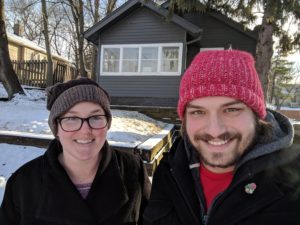21-Day Equity Challenge Reflection: Luke Elzinga
 by Luke Elzinga, Communications & Advocacy Manager, DMARC
by Luke Elzinga, Communications & Advocacy Manager, DMARC
Three years ago, my partner and I became homeowners, thanks in large part to an FHA first-time homebuyer loan. I feel incredibly fortunate to be a homeowner before the age of 30 – but it’s not luck that has led me to this point.
Our home on the south side of Des Moines lies in the C-4 section on the Des Moines Redlining Map, which gave it a rating of “Fair” when the map was created in the late 1930’s. It was a working class neighborhood then and remains so to this day. Our home is nearly 100 years old, meaning it was around 12 years old when the redlining map was drawn.
Last week’s 21-Day Equity Challenge caused me to reflect on the immense privilege I have been afforded throughout my life and continue to receive as a cisgender white man, particularly in regards to wealth and housing.
I have to wonder: how many non-white families were denied a loan to live in the house my partner and I call home over the decades? How much wealth could have been created for Black and Brown families through owning the house? If our skin color was not white or our names did not sound white, would we have even been able to get a loan today? According to the One Economy report, African Americans are denied loans at 2.2 times the average for Polk County. That’s not the 1930’s we’re talking about, that’s present day.
What could my neighborhood look like right now? What could Greater Des Moines look like had we not destroyed the city’s Black cultural district on Center Street in the 1960’s to make sure white people could easily transport themselves out of the city to their homes in the suburbs? How much human potential have we discarded based on hateful, supremacist ideas towards race, gender, country of origin, and ability? How many lives have we destroyed to uphold white society’s comfort and position?
Unfortunately, we do not have the ability to change the past. But we can change our present to remedy these injustices and build an equitable future. Don’t kid yourself – it will take bold, transformative action (and no, I am NOT talking about “financial literacy” classes). If we deny that these systemic inequities exist, if we claim to be “race blind,” if we continue to point to “personal responsibility” as the solution, rather than recognizing the pervasive systemic injustices of our society, we are upholding an oppressive status quo.
That’s why it’s so important for individuals and organizations to not only recognize the privilege they hold, but use it to make change. For centuries our country has been creating and re-creating systems of inequity to uphold white supremacy. It’s time we take a hard look at ourselves and the pain we have caused, and get serious about dismantling systems of oppression and rectifying our wrongs, even when (and especially when) that means giving up power and privilege.

Jaclyn Wulfekuhle
October 22, 2020 (9:48 am)
Great reflection, Luke!
Elisabeth Buck
October 23, 2020 (12:59 pm)
Luke, your comments were spot. I hope you enjoy your new home and continue to advocate for change. Elisabeth Buck, UWCI